Why the Business World Has to Favor Democracy in the Battles Ahead
All around the world, it seems that authoritarianism is on the rise and democracies are under attack. Here’s a look at why the whole notion of insurrections and efforts to move away from democratic norms is bad for business.
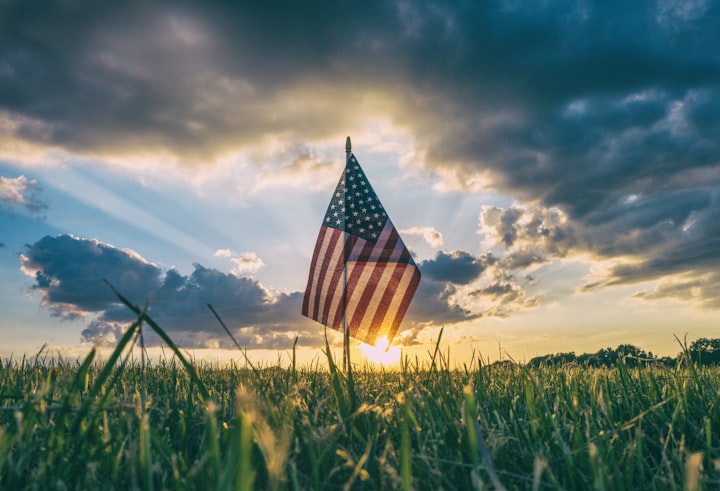
“It’s a democracy...if you can keep it.”
--- Benjamin Franklin
“The chief business of the American people is business.”
--- Calvin Coolidge
Introduction
There are lists that one aspires to be on - as individuals, as companies, and even as countries - and there are lists you don’t want to be on. One wants to be on the and “best of” lists, whatever those lists are for. We see intense competition today as companies, both big and small alike, jockey to be included on such lists - such as the best companies to work for and the fastest growing firms in an industry. We see higher education institutions often openly tailor what they do and what they offer mainly to meet the criteria for ranking higher against their peer institutions in “best of” colleges and universities lists. One of the most open secrets in the advertising world is how lists for the best doctors, the best lawyers, etc. in a given area are most often the result of what are, in essence, “pay to play” models to have oneself or one’s firm or practice included on such “best of” listings. Legal trade publications have even labelled the “best lawyers” lists that are compiled by regional and local websites and publications and law firms use to market themselves as nothing more than “lawyer ego scams” at best, and “bullshit” at worst!
Even if we, as a nation, don’t rank objectively as the “best” country in the world on many objective criteria, such as health care, education, income equality, etc., one thing generally unites Americans. We feel - or at least we want to believe - that the United States is the best country in the world! And so when we see, hear, read evidence to the contrary, it is nothing less than a “shock to the system.”
And while most of us would acknowledge that our country has its shortcomings and its lingering problems, one thing that has been a principle of our nation since its founding has been that we are a democracy. Now nevermind our history that has excluded large swaths of the population from voting (women, blacks, non-landowners, young people…), we have been taught throughout our upbringing that the U.S. is a representative democracy (after all, “Schoolhouse Rock” taught us so….).
Yes, we may have too much money in politics and we may have bitter verbal fights between the parties, but Americans have generally believed that our democracy “worked” - and that the country was an example - as then-President Ronald Reagan put it in the 1980’s, “a shining city upon a hill” - for other countries to follow.
The State of American Democracy Today
Now however, we have a country divided politically. Over the past decade, our nation has become more divided into the “red team” (the Republicans) and the “blue team” (the Democrats), with an increasingly shrinking center that is not ensconced into one of the two political camps - and particularly on the far extremes of the conservative and liberal wings of our politics. The Presidential elections of 2016 and 2020 have demonstrated just how deep and bitter these political divisions run in American society, fueled at least in part by the power of social media and the rise of political leaning news media on both the right and the left. Today, the “echo chamber” is very real, as one can exist in a world where one only sees, reads, views media that reinforces one’s political view, further polarizing our politics and exacerbating the divide between those on the red and blue sides. And now, the anger over politics has spread into action, and both sides would point to “flash points” showing just how far the other will go to “win” the day, as Republicans would point to the Black Lives Matter protests of 2020….
… and Democrats would point to the Insurrection at the U.S. Capitol on January 6th…
as extreme examples of the egregiousness of the other side (a.k.a “the opposition”).
And so there can be no doubt that the state of American democracy today is not as strong as it was a decade or two ago, even as participation in elections reached new heights with the Presidential election of 2020. More people - and a more diverse electorate than ever before - voted in that election just a year ago. Indeed, as shown in Figure 1 (Voter Turnout in U.S. Presidential Elections, 1980-2020), approximately two-thirds of all eligible U.S. voters cast a vote in the November 2020 election…
Figure 1: Voter Turnout in U.S. Presidential Elections, 1980-2020
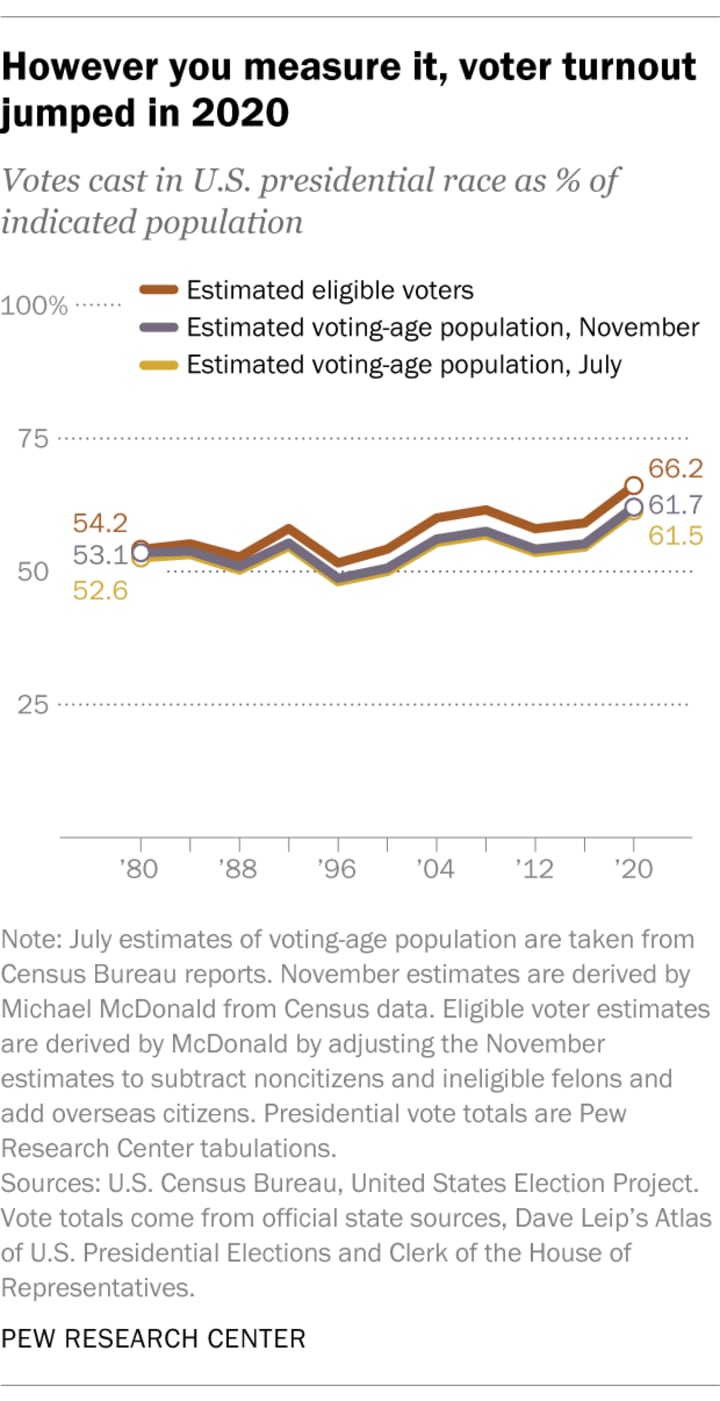
Source: Pew Research Center, Turnout Soared in 2020 as Nearly Two-thirds of Eligible U.S. Voters Cast Ballots for President, January 2021 (Used with permission).
… and voter participation actually increased in all 50 states (See Figure 2: Voter Turnout by State in the U.S. Presidential Election, November 2020). Such statistics should be seen as a positive sign about the state of American democracy. However, ever since the November
Figure 2: Voter Turnout by State in the U.S. Presidential Election, November 2020
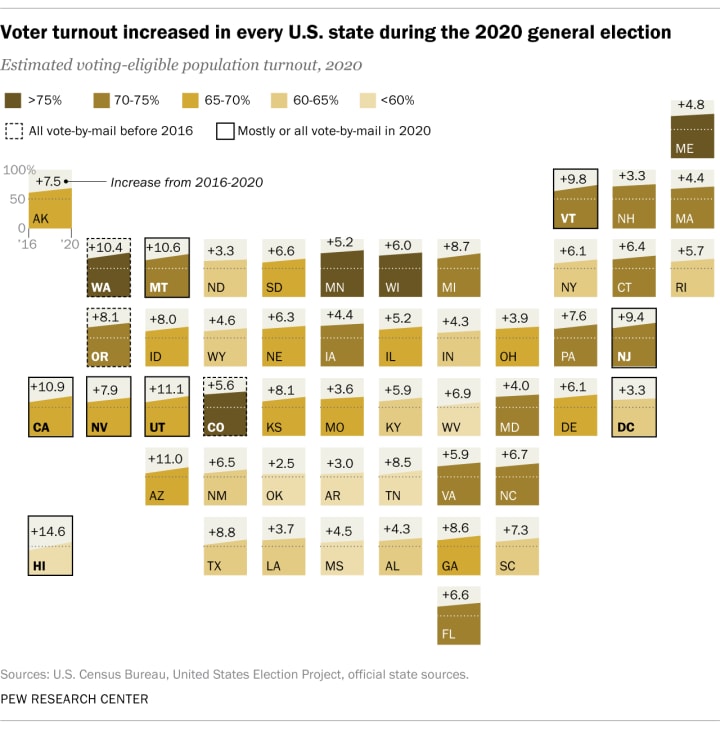
Source: Pew Research Center, Turnout Soared in 2020 as Nearly Two-thirds of Eligible U.S. Voters Cast Ballots for President, January 2021 (Used with permission).
2020 election, there have been ongoing - and successful - efforts at the state level to restrict voting, all in the cause of, as Republicans label their legislative moves, “election integrity,” and which Democrats claim to be nothing less than “voter suppression.”
All of this is why the recent release of a report on the state of democracy around the world made even more headlines than it would have otherwise. You may have seen a tweet or a headline about the most shocking - at least to Americans - finding from the report. This is the fact that for the first time, the United States was included on a list of nations where democracy was “backsliding”...
The report, entitled “The Global State of Democracy in 2021,” was issued by the Stockholm-based think tank, International Institute for Democracy and Electoral Assistance International (IDEA). This annually produced report presented a sobering look at the current state of democracies around the world. As the video below summarizes, authoritarianism is
on the march everywhere, and even though, as shown in Figure 3 (Percentage of World Populations Living Under Different Regimes, 1975 vs, 2020), far more countries are democratically governed than those that are autocratically governed, the trends toward authoritarian rule, even in seemingly advanced democracies, are disturbing. While two-thirds of the world’s population lives under governance that can be best categorized as democratic,
Figure 3: Percentage of World Populations Living Under Different Regimes, 1975 vs, 2020
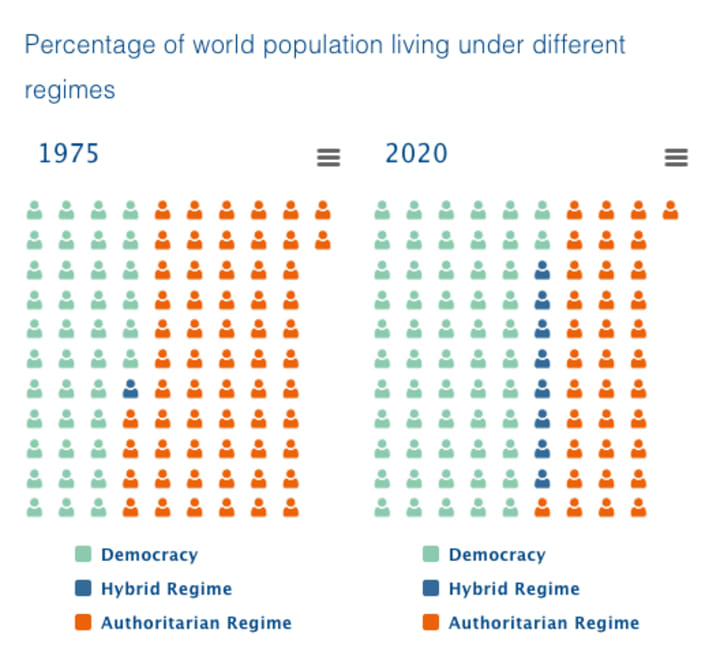
Source: International Institute for Democracy and Electoral Assistance International (IDEA), The Global State of Democracy in 2021, November 2021 (Used with permission)
as can be seen in Figure 4 (Countries Moving Away from Democracy, 1975-2020), the concerning trend of late has been that far more nations are moving away from democracy - and hence, becoming more autocratic - than those that are moving toward democratic rule.
Figure 4: Countries Moving Away from Democracy, 1975-2020
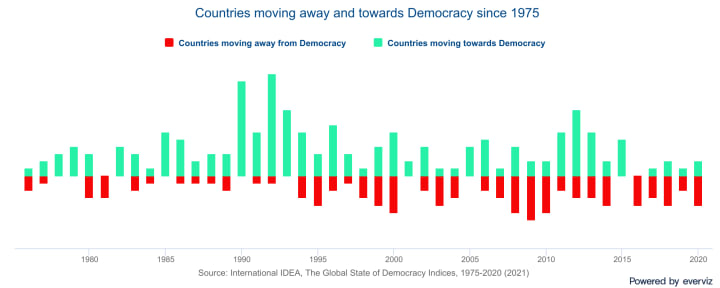
Source: International Institute for Democracy and Electoral Assistance International (IDEA), The Global State of Democracy in 2021, November 2021 (Used with permission)
And so overall today, there is a very real concern, not just in the United States, but globally as well, that democracy is on the wane. As Jutta Urpilainen, the European Commissioner for International Partnerships, recently commented: “Authoritarianism advances in every corner of the earth. Universal values – the pillars of civilization that protect the most vulnerable – are under threat.”
And yes, the United States was indeed categorized as a democracy in decline in this most current report from IDEA. As report coauthor Alexander Hudson, recently stated:
“The United States is a high-performing democracy, and even improved its performance in indicators of impartial administration (corruption and predictable enforcement) in 2020. However, the declines in civil liberties and checks on government indicate that there are serious problems with the fundamentals of democracy.”

Analysis
So what are we to make of these findings that confirm that for the first time, American democracy is not in a healthy state? While certainly there will be a plethora of research conducted into what is driving the split in American politics today and what can be done about it, there is one very practical question that has to be asked at this juncture. While many fear that the 2022 and particularly the 2024 national elections will be the “tipping point” to a very troubling time in the history of the country, just how much of a threat level - realistically speaking - are we at in terms of our fundamental form of democratic governance being threatened? For all the bluster, and for all the fears of true revolution - and even “Civil War” - that are out there today, speaking as a strategic management consultant, I would argue - perhaps optimistically, perhaps practically - that the present situation, while fraught with very real peril, will end-up with a resolution that will be less than either side of our extreme political divide can foresee at present.
Why am I somewhat - or even more so - optimistic than many political and business observers out there today regarding our current political situation in the U.S.? From my consulting perspective, I have to look at the present political situation - and even what may come in 2022 and 2024 - from a very practical perspective. The push for authoritarianism and less participation in one’s government flies in the face of practically every trend that we have seen developing - both in the U.S. domestically and indeed, globally - over the past few decades. We have become a consumer-driven society, where we expect - and demand - the ability to participate in every aspect of our lives. From what we buy to what we watch to who we vote for, we have come to expect that our voices are important - and that they will be heard. Thus, attempting to restrict our inputs on governing will be received poorly, and we can expect push back from citizens who might be seeing their voting rights lessened - or be made more difficult to exercise - against those who might seek to do so. So while Republican-led efforts to restrict voting might well succeed in the short-term, in the longer-term, perhaps looking beyond even 2024, we may well likely see a groundswell of political activity - even across the red and the blue teams of today - aimed at promoting participation.
Furthermore, I believe that two freedoms - the freedom of expression and the freedom of movement - are bedrock values in American life today. As such, I foresee some very real, and very practically-based, resistance developing against any effort that would seek to impose more authoritarian rule on American society - whether that would come from the right or the left. Any attempt at a coup and/or to impose authoritarian rule in America would mean a severe crackdown on both expression and movement. On the former, we expect to be able to say anything - literally - on social media today. And so any attempt at restricting free speech, even those that might ostensibly be aimed at preventing violence and/or limiting the dissemination of “fake news” or even dangerous information, would be pushed back against. Likewise, any attempt at imposing a modern form of martial law, restricting the ability of people to go about their daily lives and move freely, would be severely objected to by almost all in American society. One could well imagine people first laughing at the very notion of being restricted in their freedom of movement, and then, becoming very angry at any such notion. And yes, from working to shopping to socializing, we have come to expect that we can go anywhere at any time. Thus, restrictions on movement, even in an “Age of Zoom” and many such tools that can enable us to be present without being in person, are likely to be greeted with first disdain, and then, with outright hostility! Tell people that they can't go to Walmart or have to be in their homes by 10 p.m. - that would be the seeds of real revolution!
In sum, as a strategic management consultant and professor, while I view the developments in today’s politics with concern, I am confident that very practical concerns - our abilities to work, to shop, to socialize, to recreate, etc. - will work to prevent the worst of the “political porn” scenarios that are out there today that see severe disruptions - and even perhaps a new “Civil War” - in our collective American future. While democracy may not be a top concern among Americans today, even if it should be, democracy will persist out of our very modern, very genuine needs to go about our daily lives. In short, restrictions are yesterday, and choice is today. And unless those seeking political change recognize these realities, it is highly likely that our democracy will indeed survive, even if it is lessened and needs work, simply out of our expectations borne of an environment where anyone and everyone can interact with anyone today. Martial law is so 1920’s, and simply put, it won’t work in the 2020’s! It is a matter of dollars and sense - literally! And whether there are mass protests from the left or right, we have a very, very low tolerance for the disruption of our daily lives - and commerce - today. Thus, I have every faith that even if not for virtuous reasons, but out of sheer practicality, American democracy will survive well past the 250th anniversary of our founding, as our personal - and business - lives will demand that we have the freedoms to live our lives in a way to want freedom of speech, of expression, and movement.
++++++++++++++++++++++++++++++++++++++++++++++++++++
About David Wyld
David Wyld is a Professor of Strategic Management at Southeastern Louisiana University in Hammond, Louisiana. He is a management consultant, researcher/writer, publisher, executive educator, and experienced expert witness. You can view all of his work at https://authory.com/DavidWyld.
Social Media Links to David Wyld:
About the Creator
David Wyld
Professor, Consultant, Doer. Founder/Publisher of The IDEA Publishing (http://www.theideapublishing.com/) & Modern Business Press (http://www.modernbusinesspress.com)


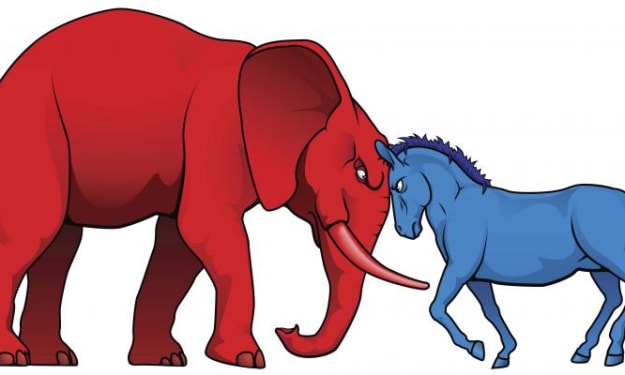



Comments
There are no comments for this story
Be the first to respond and start the conversation.